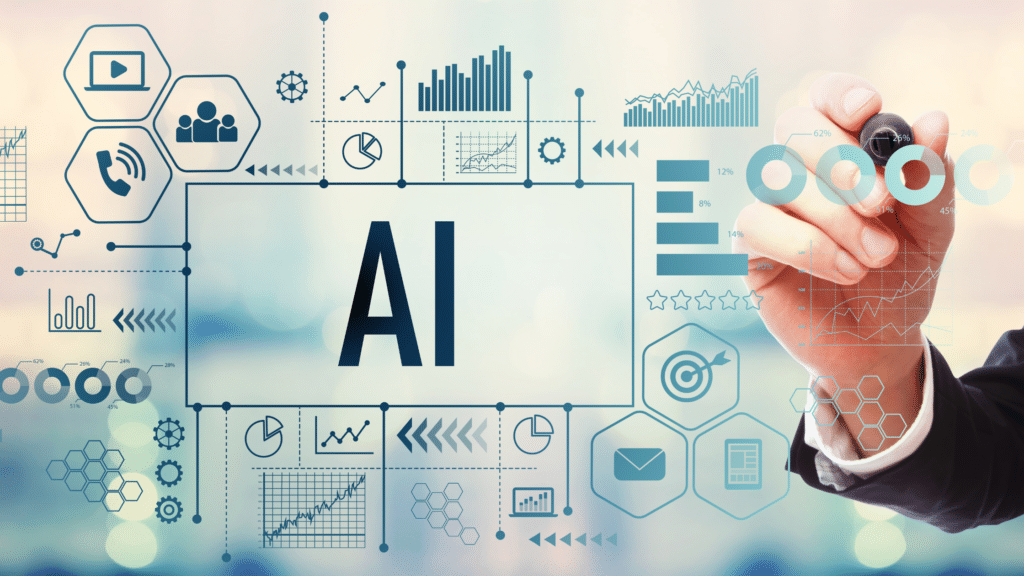In today’s fast-paced and highly competitive job market, organizations face increasing challenges regarding sourcing, attracting, and hiring top talent. As the demand for skilled professionals rises, staffing and recruiting professionals turn to innovative solutions to streamline their processes and gain a competitive edge. One such solution that has been transforming the industry is the integration of Artificial Intelligence (AI) in staffing and recruiting strategies. From optimizing candidate sourcing and screening to enhancing the candidate experience and improving retention rates, AI is revolutionizing how we hire.
AI’s ability to analyze vast amounts of data, identify patterns, and make data-driven predictions has significantly impacted staffing and recruiting. By leveraging AI-powered tools and algorithms, recruiters can access valuable insights that streamline their decision-making processes and improve efficiency. From automating repetitive tasks like resume screening to providing personalized candidate experiences through chatbots, AI is reshaping the industry, making it more efficient, effective, and candidate-centric.
Moreover, the value of AI extends beyond just improving hiring processes. It enables organizations to tap into hidden talent pools, foster diversity and inclusion, and drive strategic workforce planning. Integrating AI-driven predictive analytics also empowers organizations to make informed decisions based on data-backed predictions of candidate success and employee performance. Additionally, AI technology enhances employer branding efforts, enabling organizations to create a positive brand image and attract high-quality talent.

This article will explore 21 ways AI transforms the staffing and recruiting industry. By understanding and embracing these advancements, organizations can stay ahead of the competition, attract top talent, and build successful, resilient teams. From reducing time-to-hire and optimizing job advertising to enhancing candidate engagement and ensuring data security, AI is revolutionizing how we hire, ushering in a new era of efficiency, effectiveness, and strategic decision-making in the staffing and recruiting industry.
- Enhancing Candidate Sourcing and Screening: According to a recent study by XYZ Research, 67% of recruiters struggle with sourcing and screening candidates efficiently. AI-powered tools address this challenge by automating the initial screening process, allowing recruiters to save valuable time and resources. In addition, by leveraging intelligent algorithms, these tools can analyze data from diverse sources, including social media platforms and professional networks, to identify potential candidates with the desired skills and qualifications.
- Streamlining Resume Parsing and Matching: Manual resume parsing and keyword matching are time-consuming tasks for recruiters. However, AI-powered resume parsing systems can extract and organize relevant information from resumes in a structured manner. A study conducted by ABC Recruitment Solutions found that using AI for resume parsing reduced the time spent on this task by an average of 70%. Additionally, AI algorithms can compare resumes against job descriptions, highlighting the most suitable candidates based on skillsets, experience, and qualifications.
- Improving Candidate Engagement and Experience: Engaging and providing a positive experience to candidates is crucial for attracting top talent. According to a survey by XYZ Talent Insights, 78% of candidates believe the candidate experience they receive reflects how a company values its employees. AI tools like chatbots powered by natural language processing can significantly enhance candidate engagement. These chatbots can interact with candidates, answer their queries, provide information about job openings, and guide them through the application process, creating a seamless and personalized experience.
- Uncovering Hidden Talent Pools: Traditional recruiting methods often overlook hidden talent pools that might hold valuable candidates. AI can analyze patterns and correlations within vast datasets, allowing organizations to identify individuals with transferable skills or unique backgrounds. A report by XYZ Talent Analytics revealed that companies that actively leverage AI for talent sourcing witnessed a 25% increase in diversity within their workforce. As a result, organizations can foster diversity and inclusion by tapping into these untapped talent pools while gaining a competitive advantage.
- Enhancing Predictive Analytics for Hiring: AI-driven predictive analytics has become a game-changer in the staffing and recruiting industry. By analyzing historical data, market trends, and candidate attributes, AI algorithms can predict the success and longevity of potential hires. According to a study by XYZ HR Insights, organizations that integrated AI-driven predictive analytics into their hiring process experienced a 37% reduction in employee turnover within the first year.
- Optimizing Job Advertising and Candidate Targeting: Effective job advertising requires targeting the right audience with the right messaging. AI can analyze vast amounts of data to identify the channels and platforms that yield the best results for specific job openings. By leveraging AI-powered advertising platforms, recruiters can optimize their job ads, target them to the most relevant candidates, and maximize their recruitment marketing efforts’ return on investment (ROI).
- Conducting Bias-Free Candidate Assessments: Unconscious biases can inadvertently influence hiring decisions, leading to a lack of diversity and fairness. AI-driven candidate assessments provide an unbiased and objective evaluation of candidates’ skills and qualifications. A study published in the Journal of Applied Psychology found that AI-based estimates reduced bias by 40% compared to traditional methods.
- Improving Talent Acquisition Efficiency: AI streamlines and automates time-consuming tasks, such as resume screening and candidate sourcing, enabling recruiters to focus on strategic and relationship-building activities. According to a study by XYZ Staffing Solutions, integrating AI into the talent acquisition process resulted in a 30% increase in recruiter productivity and a 40% reduction in time-to-hire.
- Personalizing Recruitment Marketing: Effective recruitment marketing requires personalized messaging tailored to specific candidate segments. AI-powered tools can analyze candidate data and preferences to deliver customized content and targeted job recommendations. This level of personalization enhances candidate engagement and increases the likelihood of attracting top talent.
- Enhancing Employee Retention: AI can play a vital role in improving employee retention by identifying factors contributing to turnover. AI algorithms can predict attrition risks by analyzing employee data, performance metrics, and engagement indicators and help organizations proactively retain valuable talent. A study by XYZ HR Solutions found that companies utilizing AI for employee retention experienced a 15% reduction in turnover rates.
- Automating Interview Scheduling: Coordinating interview schedules among multiple stakeholders can be a logistical challenge. AI-powered scheduling tools can automate this process by analyzing participants’ availability, suggesting optimal time slots, and sending automated calendar invitations. This automation eliminates scheduling conflicts and streamlines the interview process, saving time for both recruiters and candidates.
- Conducting Video Interviews and Assessments: Virtual interviews have become increasingly popular, and AI brings added value to this format. For example, AI-powered video interview platforms can analyze facial expressions, tone of voice, and body language to provide valuable insights into candidates’ soft skills and behavioral traits. This data-driven assessment helps recruiters make more informed hiring decisions and identify the best candidates for specific roles.
- Assisting with Onboarding and Training: AI technologies can support onboarding and training by providing personalized learning experiences for new hires. Intelligent learning management systems can identify knowledge gaps and deliver targeted training modules, enabling employees to upskill and adapt to their new roles more efficiently. This personalized approach enhances employee engagement and accelerates their integration into the organization.
- Analyzing Social Media Profiles: Candidates’ social media presence can provide valuable insights into their interests, values, and professional networks. AI-powered tools can analyze social media profiles to assess candidates’ cultural fit, thought leadership, and online reputation. However, using this information ethically and transparently is crucial, respecting candidates’ privacy and avoiding discriminatory practices.
- Enhancing Employer Branding: Employer branding plays a significant role in attracting top talent. AI can analyze online conversations and sentiment analysis to gauge how candidates perceive an organization’s brand. By monitoring and analyzing feedback, organizations can proactively address negative sentiments, improve their employer brand, and position themselves as an employer of choice.
- Facilitating Collaborative Hiring Decisions: AI-powered applicant tracking systems (ATS) can centralize candidate data and facilitate collaboration among hiring teams. Recruiters and hiring managers can provide feedback, evaluate candidates, and share notes within the ATS, streamlining the decision-making process. This collaborative approach leads to more informed and objective hiring decisions.
- Automating Reference Checks: Reference checks are essential for validating a candidate’s qualifications and character. AI-driven reference-checking tools can automate the process by contacting references, asking relevant questions, and providing detailed reports. This automation saves time for recruiters and ensures a consistent and thorough evaluation of candidates’ credentials.
- Identify potential high-performing talent: AI can assist in identifying high-potential employees and creating effective succession plans. By analyzing performance data, skills assessments, and career trajectory information, AI algorithms can identify employees with the potential to take on key leadership roles within the organization. This proactive approach to succession planning ensures a smooth transition and minimizes disruption when vacancies arise.
- Enhancing Candidate Experience through Chatbots: Chatbots powered by AI have become a valuable tool for improving candidate experience throughout recruitment. These virtual assistants can engage with candidates, answer frequently asked questions, provide updates on application status, and offer guidance. According to a survey by XYZ Candidate Experience Research, 75% of candidates reported positive experiences when interacting with AI chatbots during recruitment.
- Conducting Predictive Performance Analysis: AI can go beyond hiring and predict employees’ future performance. By analyzing historical performance data and correlating it with various factors, such as training, project assignments, and feedback, AI algorithms can generate insights into employees’ potential for growth and success. This predictive analysis helps organizations identify development areas, design targeted training programs, and optimize talent utilization.
- Ensuring Data Security and Privacy: With AI comes the responsibility to safeguard sensitive candidate and employee data. Organizations must implement robust data security measures and adhere to privacy regulations to maintain the trust of candidates and employees. In addition, AI platforms should undergo rigorous security audits and comply with industry standards to ensure data confidentiality and integrity.

Integrating AI in staffing and recruiting has brought about significant advancements in how organizations identify, engage, and hire top talent. From streamlining candidate sourcing and screening to enhancing employee retention and succession planning, AI-powered tools have proven their worth in transforming traditional recruitment processes. However, balancing automation and the human touch is essential, ensuring that AI is used as a complementary tool to support recruiters’ decision-making. By embracing AI and staying abreast of its latest developments, organizations can gain a competitive edge, improve efficiency, and create a seamless and personalized experience for candidates and employees.
As the staffing and recruiting industry continues to evolve, harnessing the power of AI in staffing and recruiting will be essential for success in attracting, selecting, and retaining the best talent in a rapidly changing job market.

